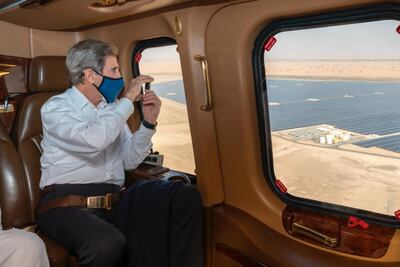US Special Presidential Envoy for Climate John Kerry praised the success of vital talks in Abu Dhabi aimed at delivering a better future for the planet.
Speaking after taking part in the Regional Dialogue for Climate Action on Sunday, Mr Kerry said oil-producing nations such as the UAE could be central to efforts to combat climate change.
The veteran politician, who was appointed climate change envoy by US President Joe Biden, praised the "incredible energy projects" helping to shape the green agenda in the Emirates.
During his tour, Mr Kerry visited Noor solar park in Abu Dhabi, the largest single-site solar facility in the world, as well as other major players in the sustainability drive such as the International Renewable Energy Agency, or Irena, and renewable energy company Masdar.
"Very honored to have participated in the landmark, climate-change-focused regional dialogue in the Middle East, hosted by UAE," Mr Kerry said on Twitter.
"There’s no reason why oil-producing countries cannot also be a key part of tackling the climate crisis.
"From solar sites to sustainable urban development, there are incredible energy projects happening here.
"Clean-energy economies will set us on the right path to achieving the Paris Agreement goals. Advancing clean technology and low-carbon energy now is critical – there's no time to waste."
Following the crucial climate change talks, the UAE and the US vowed to continue to work closely together to safeguard the environment.
After the Regional Dialogue for Climate Action, 11 countries came together to call for greater efforts to halt rising temperatures and implement the 2015 Paris Agreement on climate change.
The UAE and US signalled their intent to step up joint efforts in a crucial year for the environment before the UN's Climate Change Conference, or Cop26, in November in Glasgow, Scotland.
Dr Sultan Al Jaber, the UAE’s special envoy for climate change, said both countries affirmed that acting on the climate can be an engine for economic growth and sustainable development.
"Building on the legacy and experience of the UAE, which has demonstrated a longstanding commitment to sustainable development and today operates three of the world’s largest solar facilities, we will focus, together with the US, on joint efforts on renewable energy, hydrogen, industrial decarbonisation, carbon capture and storage, nature-based solutions and low-carbon urban design," Dr Al Jaber said.
How the UAE is leading the renewable-energy charge

The UAE has set ambitious goals to rapidly increase the amount of energy it generates from green and renewable sources.
At the end of last year, the country's renewable capacity reached 2.3 gigawatts.
That is forecast to leap to nine gigawatts by 2025.
Alongside the Noor solar site, which began generating power in 2019, there are four new projects that will drive this growth.
The biggest is the 2-gigawatt Al Dhafra solar scheme in Abu Dhabi, 50 kilometres outside the capital.
That site is expected to become fully operational in 2022 and will generate enough electricity for about 160,000 homes.
Dubai currently has more than one gigawatt of installed capacity – all of which comes from three phases at the Mohammed bin Rashid Solar Park.

















